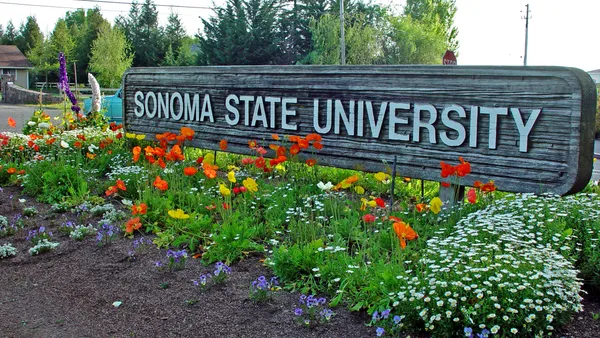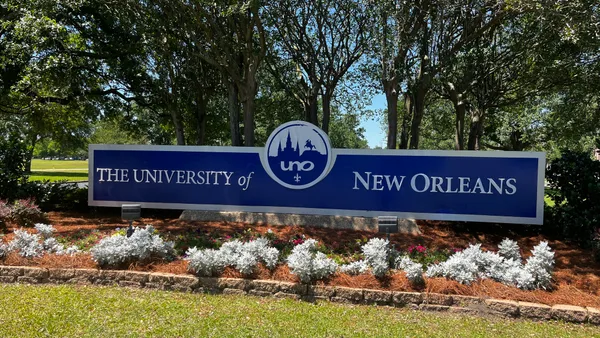Dive Brief:
- Arizona State University launched an initiative Thursday that aims to reach 100 million learners worldwide in an online global management and entrepreneurship certificate program by 2030.
- The certificate program, which will be translated into 40 languages, will be offered through Arizona State's Thunderbird School of Global Management. An initial donation of $25 million is helping to fund the program, which will make the certificates free to learners through full scholarships.
- Learners will receive a badge after completing each of five graduate-level courses in the program. Completion of all the courses leads to a certificate granting 15 credit hours that can be applied to degrees at Thunderbird, Arizona State and other institutions, according to a program brochure.
Dive Insight:
Arizona State isn't the first institution that's attempted to reach learners worldwide through online programs. For roughly a decade, several well-known companies have worked with higher education institutions to offer massive open online courses, or MOOCs, as a way to bring free or low-cost education to people who couldn't otherwise access it.
Thunderbird Dean Sanjeev Khagram described the new effort as "a MOOC 4.0"
"Think about it as a MOOC with all of the new digital tools that we have," Khagram said.
Small teams of faculty members will curate the courses' content, which will contain interactive exercises and allow students to connect through peer groups. Faculty associates will provide feedback to students, a process that will be aided over time by artificial intelligence, Khagram said.
"We're going to have tons and tons of data coming back from the questions they [students] ask," Khagram said. "Over time, we can build that into — through AI and machine learning technology — systems that can be responsive to the learners."
While the program is starting with graduate courses, it may add undergraduate classes in the future, as well as classes for learners with little formal education.
Businessman F. Francis Najafi and his wife Dionne Najafi provided the initial $25 million donation. The initiative is also hoping to raise more funds to meet its goals.
Still, higher education experts were skeptical the initiative could achieve its hoped-for growth.
The program benefits from the well-known names of Thunderbird and Arizona State, as well as the $25 million donation, said Phil Hill, a partner with ed tech consultancy MindWires. But it took popular MOOC platforms years and hundreds of millions of advertising dollars to reach a scale similar to what Arizona State is hoping to achieve, Hill said.
"Somehow they think they're going to create something that's just another level of scale we've never seen before," Hill said.
Coursera, a MOOC provider launched in 2012, had more than 92 million registered learners on its platform as of late last year. Around the same time, edX, a competitor, had 41 million registered learners.
It will also be difficult to make inroads in some of the locations the program hopes to reach, such as Africa.
"Language is not the sole barrier," said Daniel Pianko, co-founder and managing director of higher ed-focused investment firm University Ventures. "There are many, many barriers for why people from these communities are unable to access Western high-quality education."
They include a lack of trust. "Reaching people in these geographies generally requires physical presence, local accreditation, access to technology," Pianko said, adding that much more than $25 million is needed to achieve the initiative's goals.
According to the program's brochure, Thunderbird plans to use its global network of 50,000 alumni and 16 “Centers of Excellence” across the globe to build local and regional partnerships. It also plans to use external partnerships to help with branding and publicity, translation, and marketing to and recruiting learners.














